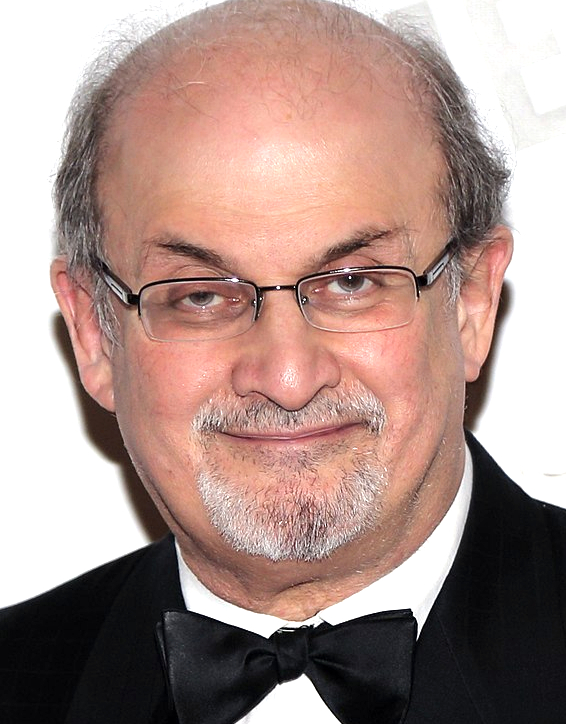On this date in 1947, Salman Rushdie was born in Mumbai, India, into a middle-class Muslim family. At 14, Salman was sent to Rugby School in England. In 1964 his family moved to Karachi, Pakistan. Rushdie graduated in 1968 from King’s College, Cambridge. After a fling at acting, television and freelance copy writing, he saw his first book published in 1975, a sci-fi adventure called Grimus. Midnight’s Children, 1981, won the Booker Prize and catapulted Rushdie at age 33 to international attention. Shame followed in 1983.
His novel Satanic Verses (1988), which was banned in India and South Africa, brought down the notorious death fatwa upon him by Ayatollah Ruhollah Khomeini on Feb. 14, 1989. As V.S. Naipaul understatedly put it, the fatwah was “an extreme form of literary criticism.” Rushdie was forced to go into hiding. A $1 million bounty was placed on his head. The reward for his death was doubled in 1997. The Iranian government officially rescinded the fatwah in September 1998, although at least one ayatollah later issued his own.
Rushdie’s nonfiction essays from 1992 to 2002 appear in the book Step Across This Line. In one essay for The New York Times (Nov. 27, 2002), Rushdie wrote: “If the moderate voices of Islam cannot or will not insist on the modernization of their culture — and of their faith as well — then it may be these so-called ‘Rushdies’ who have to do it for them. For every such individual who is vilified and oppressed, two more, ten more, a thousand more will spring up. They will spring up because you can’t keep people’s minds, feelings and needs in jail forever, no matter how brutal your inquisitions.”
In a column headlined “Slaughter in the Name of God” (Washington Post, March 8, 2002), Rushdie wrote: “In India, as elsewhere in our darkening world, religion is the poison in the blood. Where religion intervenes, mere innocence is no excuse. Yet we go on skating around this issue, speaking of religion in the fashionable language of ‘respect.’ What is there to respect in any of this, or in any of the crimes now being committed almost daily around the world in religion’s dreaded name?”
He was knighted by Queen Elizabeth II in 2007 for his services to literature. Rushdie has married five times and has two sons, Zafar, born in 1979, and Milan, born in 1997. He became an American citizen in 2016. Rushdie spoke at FFRF’s national convention in San Francisco on Nov. 2, 2018, when he accepted the Emperor Has No Clothes Award. Quichotte, his 14th novel, was published in 2019 and was inspired by Miguel de Cervantes’ Don Quixote.
Rushdie was attacked onstage in August 2022 at the Chautauqua Institution in Chautauqua, N.Y., as he was preparing to start a lecture. His alleged assailant, 24-year-old Hadi Matar of Fairview, N.J., whose parents were Lebanese immigrants, stabbed him about a dozen times, which resulted in Rushdie being put on a ventilator and hospitalized for six weeks. Though he recovered, he lost the sight in his right eye and the use of his left hand.
PHOTO: Rushdie in 2014 at the PEN American Center in New York; © Ed Lederman under CC 2.0


